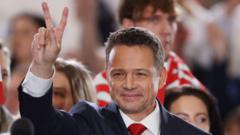Rafal Trzaskowski, Warsaw's liberal mayor, has won the first round of Poland's presidential election with 31.3% of the vote, facing off against conservative Karol Nawrocki, who secured 29.5%. As the candidates prepare for a run-off, the political landscape showcases challenges and potential shifts in voter alliances affecting future governance.
Tight Presidential Race Ahead as Warsaw’s Mayor Secures First Round Victory

Tight Presidential Race Ahead as Warsaw’s Mayor Secures First Round Victory
In a closely contested election, Rafal Trzaskowski emerges as Warsaw's mayor, setting the stage for a decisive second round against conservative contender Karol Nawrocki.
Warsaw Mayor Rafal Trzaskowski has emerged victorious in the first round of Poland's presidential election, albeit narrowly, capturing 31.3% of the votes against conservative historian Karol Nawrocki, who garnered 29.5%. This outcome leads to a necessary second-round poll set for June 1, as neither candidate achieved the required majority of over 50% for outright victory.
The state electoral commission (PKW) reported a noteworthy turnout exceeding 67%, reflecting significant public engagement in the electoral process. Despite expectations that had placed Trzaskowski ahead in pre-election polls, he fell short of the anticipated margins, indicating a tightly contested race.
At a rally in Sandomierz, Trzaskowski roused his supporters with sentiments of teamwork and commitment, asserting, "I'm convinced that all Poland will win." He emphasized his intent to work closely with prime minister Donald Tusk’s coalition towards crucial reforms, including liberalizing restrictive abortion laws and addressing the politicization of the judiciary previously influenced by the conservative-led government.
The presidential role in Poland may be largely symbolic, but it carries the power to veto legislation, presenting a strategic challenge for Tusk’s coalition, which lacks a sufficient parliamentary majority to override a presidential veto. The forthcoming battle for the presidency will also be influenced by division within the coalition on vital issues like abortion rights and civil partnerships.
Nawrocki, representing the conservative Law and Justice party (PiS), aims to rally support against what he perceives as Tusk’s quest for total dominance in Poland. As the candidates aim to mobilize their bases for the second round, voter dynamics have become paramount. Nawrocki’s lesser-known status at the national scale previously may now work in his favor as PiS has historically excelled at galvanizing their supporters.
Complications arise for Trzaskowski as he seeks to appeal not only to centrist voters but also to supporters of junior coalition partners, The Left and conservative Third Way, whose backing will be critical for his success in the runoff. As candidate alignments evolve, the surprising performance by far-right candidates complicates the narrative, leaving many young and independent voters uncertain on which route to pursue.
While it remains to be seen how voter habits will shift as the candidates vie for attention, the marked presence of far-right sentiments is likely to influence decisions, potentially steering supporters toward Nawrocki, who embodies family-oriented conservative values, despite their grievances with PiS's fiscal policies.
The political climate intensifies as Trzaskowski and Nawrocki transition towards a definitive electoral outcome, beckoning a close examination of the Polish political sphere where every vote counts in shaping the future path.




















